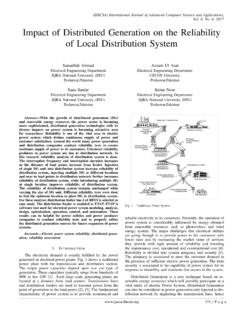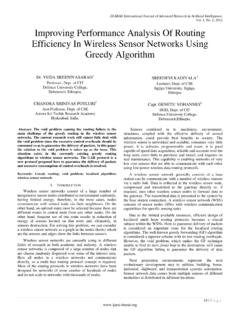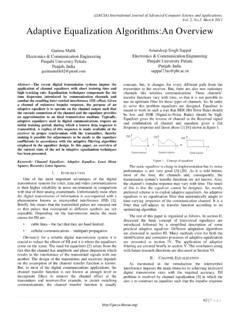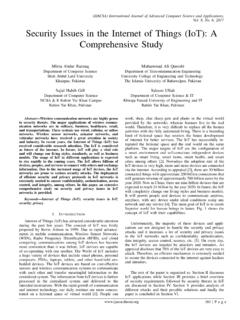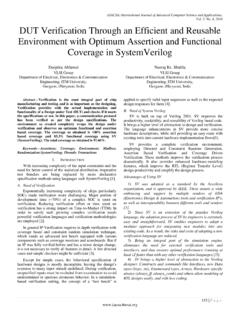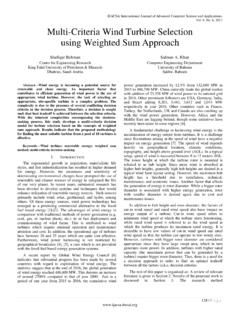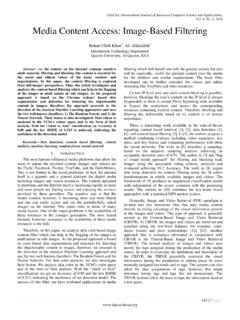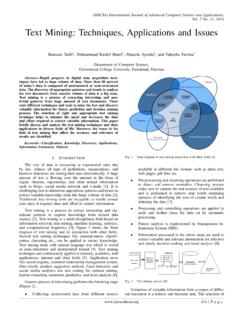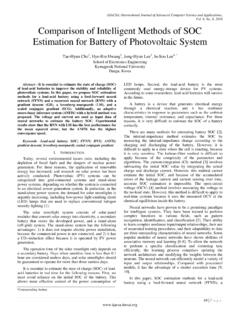Transcription of The Impact of Knowledge Management on Organizational ...
1 (IJACSA) International Journal of Advanced Computer Science and Applications, Vol. 9, No. 4, 2018 204 | P a g e The Impact of Knowledge Management on Organizational Abuaddous, Abdullah Al Sokkar Faculty of Computer Science and Informatics Amman Arab University (AAU) Amman, Jordan Blaqees I. Abualodous Digital Product Planner Disrupt Technologies Amman, Jordan Abstract In today s business , Knowledge is considered as a core asset in any organization, even it can be considered as important as technological capital. It is part of human abilities and thus human capital. Knowledge Management (KM) is becoming a fad in an increasing way so many organizations are trying to apply it in order to enhance their Organizational performance.
2 In this paper, literatures were investigated critically in order to show the real influence of Knowledge Management and some of its practices on Organizational performance. It has been founded that KM including Knowledge process and infrastructure capabilities affect positively in a huge manner on all aspects of Organizational performance directly or indirectly. In the same vein, there is a huge need to continuously train and educate the learning organizations CEOs about the importance of KM through group works and training programs. Keywords Knowledge Management ; infrastructure capabilities; process capabilities; Organizational performance; learning organizations I.
3 INTRODUCTION In this dynamic competitive world and with the clearly influence of information technology (IT) on the business environment, the need arises to get a competitive advantage amid the vast amount of competitors. It has been noticed that a strong tendency within organizations to consider Knowledge and its Management as a core asset and valuable concept , where their competitive advantage -which they all aspire to- lies in [1]. Knowledge is not just facts and numbers that organizations have on spreadsheets or in maps but rather it concerns the whole human experience acquired through education and working skills and experience [2].
4 Today s businesses are characterized by a high degree of complexity and that indicates for a more accumulation in Knowledge , and for sure this leads to a more difficulty in managing and controlling it in terms of storage, organizing and etc. Correspondingly and according to [3], there is an increasing investment in Knowledge Management every year, where they have cited in their research, Forrester Research Inc. (2010) found that 20 percent of businesses with small and medium size have the intention to construct Customer Relation Management (CRM) or information and Knowledge Management tools in 2010 or later in North America and Europe.
5 Therefore, we can induce that organizations are strongly starting to believe in Knowledge Management (KM) as a chance to achieve what the majority of them strive for. Logically, when organizations discuss all of the above, it is mainly prompt to improve their performance and the development of decision-making processes and thus to increase profitability and sustainability in today s global markets, and perhaps to get the Knowledge capability that enhance the effective Management and effective flowing for information and Knowledge inside the business [4]. This paper will focus on evaluating the Impact of Knowledge Management and its resources on the Organizational performance in order to reach competitive advantages.
6 Besides, this paper will also aim to provide the reader with an overview of Knowledge Management , and learning organizations. This paper is organized as follows: the first section of the literature presents an overview of Knowledge Management ; the second section gives an overview to the Knowledge Management and its Impact on Organizational performance. The third section will address the learning organizations and how Knowledge Management will affect them. Finally, future work and conclusion are II. AN OVERVIEW OF Knowledge Management AND ITS CAPABILITIES The Knowledge that organizations possesses is one of the most important assets that helps them in attaining competitive advantage, even in some cases, it becomes more important than the financial resources and all other tangible assets [2].
7 With this in mind, Knowledge Management has become an attractive subject for research and studies in the last twenty years [5] including this research. It can be precisely defined as the process of capturing information and experience of individuals and the organization which is available in databases, on paper, or even in people s intellect and distributing it to wherever it can produce benefit [6]. Additionally, Knowledge Management can be attributed as a portfolio of strategies and activities that is related to the process of acquiring, transferring, and sharing Knowledge with all organization s people [7]. Researchers noticed that most of their respondents are well educated about Knowledge Management [7], while others argue that there is unexpected level of misunderstanding to the real Knowledge Management and its real importance [6].
8 Above all, the strongly need for an effective implementation to Knowledge Management arises from the organizations need to achieve goals such as establishing a competitive advantage to amid the current globalization, also, adapting the organizations with constantly changes and build involved workforce as well as increasing the productivity amid to a highly turnover and downsizing [12]. (IJACSA) International Journal of Advanced Computer Science and Applications, Vol. 9, No. 4, 2018 205 | P a g e Author in [12] considered Knowledge Management as a technique that uses the values of Knowledge resources in order to enhance the performance for both organizations and employees.
9 They also focus on its ability in facilitating the process of attaining data and information on the needed time, and in improving both strategic and tactical operational activities needed to attain Organizational goals. From the theoretical point of view, the components of the Knowledge Management are (people, processes, technology, culture and structure) and those are the foundation of the Knowledge Management system [5], where literatures acknowledged that Knowledge Management determines the Knowledge flow inside firms in four steps inside each defined process, which are Knowledge creation, retention, transfer, and utilization [2], [6], [8].
10 Other research added another step titled with Knowledge internalization [9]. All the above mentioned activities can be conducted in the organization with relatedness to Knowledge Management and they can be defined as Knowledge Management practices and that may include locating, sharing, creating and encouraging through openness culture [10], [11]. Knowledge Management may in some cases be affected by demographic characteristics of the organization s employees in a highly manner [7]. Usually, when talking about the Knowledge capability of a firm, we can distinguish it into two types of capabilities including firm s Knowledge infrastructure capability ( , technology infrastructure, Organizational structure, and culture) and the firm s Knowledge process capability or Knowledge Management enablers ( , Knowledge acquisition, conversion, application and protection) [9].
